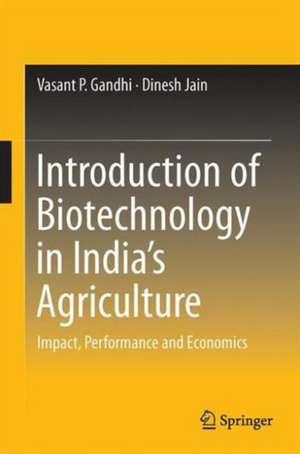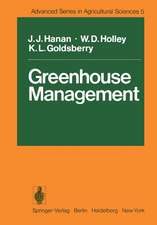Introduction of Biotechnology in India’s Agriculture: Impact, Performance and Economics
Autor Vasant P. Gandhi, Dinesh Jainen Limba Engleză Hardback – 9 aug 2016
| Toate formatele și edițiile | Preț | Express |
|---|---|---|
| Paperback (1) | 631.73 lei 38-45 zile | |
| Springer Nature Singapore – 22 apr 2018 | 631.73 lei 38-45 zile | |
| Hardback (1) | 736.94 lei 3-5 săpt. | |
| Springer Nature Singapore – 9 aug 2016 | 736.94 lei 3-5 săpt. |
Preț: 736.94 lei
Preț vechi: 898.72 lei
-18% Nou
Puncte Express: 1105
Preț estimativ în valută:
141.01€ • 147.23$ • 116.71£
141.01€ • 147.23$ • 116.71£
Carte disponibilă
Livrare economică 14-28 martie
Preluare comenzi: 021 569.72.76
Specificații
ISBN-13: 9789811010903
ISBN-10: 9811010900
Pagini: 190
Ilustrații: XXIX, 272 p. 41 illus. in color.
Dimensiuni: 155 x 235 x 21 mm
Greutate: 0.71 kg
Ediția:1st ed. 2016
Editura: Springer Nature Singapore
Colecția Springer
Locul publicării:Singapore, Singapore
ISBN-10: 9811010900
Pagini: 190
Ilustrații: XXIX, 272 p. 41 illus. in color.
Dimensiuni: 155 x 235 x 21 mm
Greutate: 0.71 kg
Ediția:1st ed. 2016
Editura: Springer Nature Singapore
Colecția Springer
Locul publicării:Singapore, Singapore
Cuprins
1. Introduction and objectives of the study.- 2. An overview of cotton in India.- 3. Development and adoption of Bt Cotton.- 4.Sampling and methodology of the study across the states.- 5. Nature and performance of Bt Cotton vs. non-Bt Cotton.- 6. Economics of Bt Cotton vs. non-Bt Cotton across the states.- 7. Farmers’ perceptions on various features of Bt Cotton.- 8. Overall summary and conclusions.- 9. Cotton cultivation in Andhra Pradesh.- 10. Sampling and methodology.- 11. Nature and performance of Bt Cotton vs non-Bt Cotton In Andhra Pradesh.- 12. Economics of Bt Cotton vs non-Bt Cotton In Andhra Pradesh.- 13. Farmers’ perceptions on various features of Bt Cotton in Andhra Pradesh.- 14. Cotton cultivation in Gujarat.- 16.Nature and performance of Bt Cotton vs. non-Bt Cotton in Gujarat.- 17. Economics of Bt Cotton vs. non-Bt Cotton in Gujarat.- 18. Farmers’ perceptions on various features of Bt Cotton in Gujarat.- 19. Cotton cultivation in Maharashtra.- 20. Sampling and methodology.- 21. Nature and performance of Bt Cotton vs. non-Bt Cotton in Maharashtra.- 22. Economics of Bt Cotton vs. non-Bt Cotton in Maharashtra.- 23. Farmers’ perceptions on various features of Bt Cotton in Maharashtra.- 24. Cotton cultivation in Tamil Nadu.- 25. Sampling and methodology.- 26. Nature and performance of Bt Cotton vs. non-Bt Cotton in Tamil Nadu.- 27. Economics of Bt Cotton vs. non-Bt Cotton in Tamil Nadu.- 28. Farmers’ perceptions on various features of Bt Cotton in Tamil Nadu.- References.
Notă biografică
Vasant P. Gandhi is a Professor at the Indian Institute of Management, Ahmedabad (IIMA) in India, and is currently the NABARD Chair Professor. He did his Ph.D. from Stanford University, Masters in Management from IIMA and Bachelors in Agriculture from Pantnagar. He is the Chairman of IIMA’s Centre for Management in Agriculture (CMA). He has worked with the World Bank, and the International Food Policy Research Institute (IFPRI) in Washington, and has been a Visiting Professor at the University of Sydney and the James Cook University, Australia. He has been consultant/ Advisor to FAO, the World Bank, Government of India, various state governments, Agriculture Insurance Company of India, and McKinsey & Company, various high level government committees, and is on several company Boards. His areas of research in which he has published extensively include international food and agriculture policy, technology for agricultural growth, water resource management and institutions, agricultural markets and agribusiness.
Dinesh Jain did his doctorate from Indian Institute of Management, Ahmedabad (IIMA) and is associated with the Entrepreneurship Development Institute of India (EDI) as Associate Faculty. He did the doctoral Fellow Programme in Management (FPM) with specialisation Agribusiness from IIMA, and prior to this, Masters in Business Administration (Agribusiness Management) and Bachelors of in Agricultural Engineering. At EDI, he is the Programme Coordinator for EDI’s Post Graduate Diploma in Management-Development Studies. He has done extensive research through projects of Australian Centre for International Agriculture Research (ACIAR), International Food Policy Research Institute (IFPRI), Global Development Network (GDN), and Ministry of Agriculture-Govt. of India. His areas of research include institutional innovations and design especially in water management, agri-entrepreneurship, new technology adoption in agriculture, food security, and impact assessment of development initiatives.
Dinesh Jain did his doctorate from Indian Institute of Management, Ahmedabad (IIMA) and is associated with the Entrepreneurship Development Institute of India (EDI) as Associate Faculty. He did the doctoral Fellow Programme in Management (FPM) with specialisation Agribusiness from IIMA, and prior to this, Masters in Business Administration (Agribusiness Management) and Bachelors of in Agricultural Engineering. At EDI, he is the Programme Coordinator for EDI’s Post Graduate Diploma in Management-Development Studies. He has done extensive research through projects of Australian Centre for International Agriculture Research (ACIAR), International Food Policy Research Institute (IFPRI), Global Development Network (GDN), and Ministry of Agriculture-Govt. of India. His areas of research include institutional innovations and design especially in water management, agri-entrepreneurship, new technology adoption in agriculture, food security, and impact assessment of development initiatives.
Textul de pe ultima copertă
Biotechnology can bring major breakthroughs in agriculture. The book examines the experience of introduction of biotechnology in Indian agriculture, specifically, examining the performance of Bt cotton versus non-Bt cotton across India’s major cotton states, namely Andhra Pradesh, Gujarat, Maharashtra and Tamil Nadu, which together account for nearly 70 percent of the country’s cotton production. Major advances in biotechnology have made it possible to directly identify genes, determine their functions, and transfer them from one organism to another. The advances have spawned many technologies and Bt cotton is one important outcome. Bt cotton has become one of the most widely cultivated transgenic crops and is currently grown in 21 countries - 11 developing and 10 industrialized countries. The Government of India was relatively late in permitting biotechnology, only approving the cultivation of three transgenic Bt cotton hybrids from April 2002. Many concerns were raised about their performance there was strong opposition from some quarters. In India, Gujarat and Maharastra were the first states to adopt them, followed by Andhra Pradesh, Karnataka, Tamil Nadu and Madhya Pradesh. Based on a sample of 694 farming households, the book examines and analyzes the performance on the yields, pesticide costs, seed costs, overall production costs and profits. It also reports on the environmental impacts, satisfaction with the technology and ways of improving its performance.
Caracteristici
Examines the development of Bt cotton as a pest-resistant variety under both irrigated and un-irrigated conditions in selected states Assesses the cost of cultivation and economics of Bt cotton as compared to other cotton varieties grown Presents farmers’ observations on Bt cotton with respect to the technology, crop performance, pest incidence, and impact on other crops and the environment



